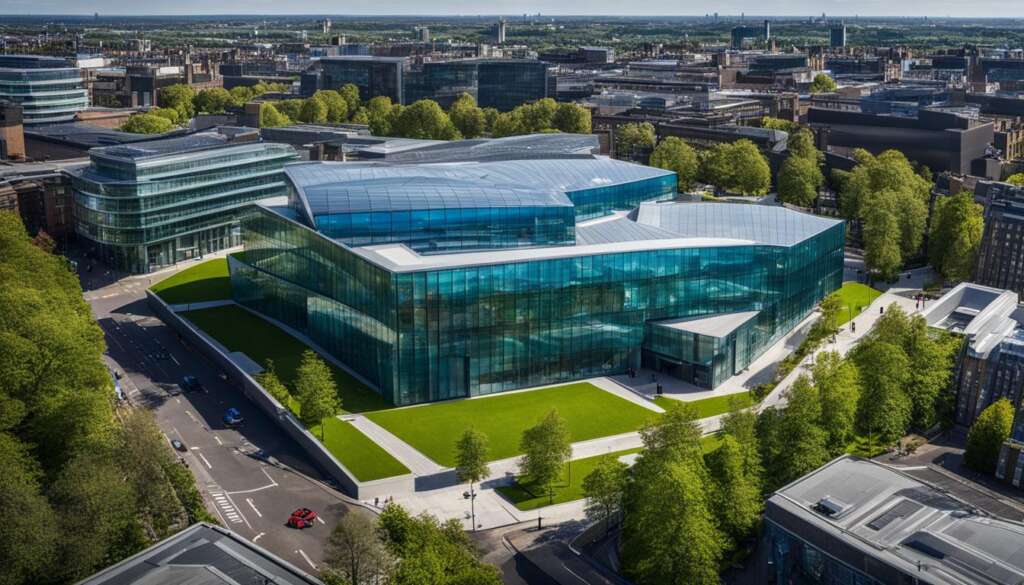Table of Contents
King’s College London has partnered with the London Centre for Nanotechnology (LCN) to address global healthcare, energy, and environmental challenges through the power of nanotechnology. The LCN, established in 2003, is a research center that brings together King’s, UCL, and Imperial College London. The center has already made significant advancements in nano research, including the development of a mobile phone-connected tool for HIV detection and early-warning systems for disease outbreaks. King’s will contribute its expertise in high-resolution optical imaging, nanobiology, and nanophotonics to the partnership.
London Centre for Nanotechnology (LCN)
The London Centre for Nanotechnology (LCN) is a collaborative research center jointly established by UCL and Imperial College London. This multidisciplinary center serves as a bridge between the physical and biomedical sciences, bringing together experts from various departments to drive advancements in nanotechnology research and applications.
At the LCN, scientists and researchers from disciplines such as medicine, chemistry, physics, electrical and electronic engineering, biochemical engineering, materials, and earth sciences collaborate to explore the potential of nanotechnology. By harnessing the collective expertise of these disciplines, the center aims to push the boundaries of nanotechnology and contribute to cutting-edge advancements.
Through its collaborative approach, the London Centre for Nanotechnology plays a pivotal role in driving breakthroughs in numerous fields, including miniaturizing computer systems and spintronics. With state-of-the-art facilities and a strong emphasis on multidisciplinary research, the LCN is at the forefront of nanotechnology innovation.
The London Centre for Nanotechnology is committed to fostering partnerships and collaborations with leading institutions and industry players to further accelerate progress in nanotechnology research. By working together, scientists and experts from the LCN, UCL, and Imperial College London can combine their resources, knowledge, and expertise to tackle complex challenges and develop innovative solutions.
Nanotechnology Research in China
The London Centre for Nanotechnology (LCN) actively engages in international collaborations to advance nanotechnology research and its applications. Through strategic partnerships with renowned Chinese institutions, the LCN is driving innovation in the field of nanoscience and nanotechnology. Two notable collaborative projects in China focus on the exciting domain of spintronics, which explores the manipulation of electron spin for technological advancements.
One of these projects, in collaboration with Peking University and Tsinghua University, is dedicated to molecular nanospintronics. By harnessing the magnetic properties of individual molecules or atoms, this project aims to develop novel approaches to miniaturizing computer systems. Such advancements in molecular nanospintronics could revolutionize computing technology, leading to faster and more efficient devices.
The second project, in partnership with the University of Surrey, focuses on investigating silicon-based spintronics. Silicon is a commonly used material in the semiconductor industry, and spintronics research aims to harness its unique spin characteristics for various applications. This project aims to unlock the potential of silicon-based spintronics to enhance computing and information storage capabilities, further pushing the boundaries of nanotechnology.
Collaborating with esteemed Chinese universities enriches the LCN’s research endeavors by leveraging the expertise and perspectives of scientists from around the world. This international collaboration is a testament to the LCN’s commitment to driving nanotechnology forward through global partnerships.
As part of the section, here is an image related to nanotechnology research:
Benefits of Nanotechnology Research Collaboration
Working with leading Chinese institutions such as Peking University and Tsinghua University allows the London Centre for Nanotechnology to harness a diverse range of knowledge and expertise to push the boundaries of nanotechnology research.
The collaboration with Chinese universities provides several benefits:
- Access to a global pool of talent: Partnering with leading Chinese institutions grants the LCN access to top researchers and scientists in the field of nanotechnology. This diverse range of expertise enhances the quality and impact of research outcomes.
- Collaborative exploration of spintronics: By working together, researchers from the LCN and Chinese universities can jointly explore and experiment with spintronics, optimizing the use of individual molecules and atoms for various technological applications.
- Cultural exchange and knowledge transfer: Collaboration fosters cultural exchange and facilitates knowledge transfer between researchers, enabling the sharing of best practices and the cross-pollination of ideas.
- Promoting global collaboration: Collaborations between the LCN and Chinese institutions showcase the importance of international cooperation in advancing nanotechnology research and promoting scientific progress for the benefit of society.
The London Centre for Nanotechnology’s partnerships with esteemed Chinese institutions demonstrate its commitment to fostering global collaborations and driving the future of nanotechnology research.
Nanotechnology Applications in Healthcare
The London Centre for Nanotechnology has received a £2 million EPSRC grant to revolutionize healthcare through nanotechnology. This funding will support the development of a groundbreaking device for people living with HIV, allowing them to monitor their health and treatment progress with ease.
This device will act as an early warning system, providing real-time insights into the effectiveness of anti-retroviral treatments. By using nano-cantilever arrays, tiny mechanical sensors capable of measuring HIV and other protein markers, patients will have immediate access to crucial information about their health status.

The London Centre for Nanotechnology’s device will empower HIV patients to take control of their health and make informed decisions. If the virus shows resistance to current treatments, individuals can seek medical help promptly, ensuring timely intervention and reducing potential complications.
The EPSRC grant represents an acknowledgment of the London Centre for Nanotechnology’s exceptional work in transforming healthcare through nanotechnology. This project showcases the center’s commitment to leveraging scientific innovation for the benefit of society.
Collaborative Research Projects with China
The London Centre for Nanotechnology (LCN) actively engages in collaborative research projects with esteemed partners in China to further the progress of nanotechnology. By fostering international collaborations, the LCN facilitates the exchange of knowledge and expertise, contributing to the advancements in nanotechnology research on a global scale.
Fourth Generation Wireless Communication
One notable collaborative project between the LCN and Chinese institutions aims to revolutionize wireless communication. The ‘Fourth Generation Wireless Communication’ project combines the scientific expertise of researchers from both the LCN and their counterparts in China to develop innovative wireless communication technologies. This project paves the way for improved connectivity, faster data transfer rates, and enhanced network capabilities.
Development of Multifunctional Nanostructures
Recognizing the urgent need to combat carbon dioxide emissions and harmful pollutants, another collaborative project focuses on developing multifunctional nanostructures that can capture these pollutants in coal-fired power stations. This project, conducted in partnership with Chinese research institutions, aims to mitigate the environmental impact of power generation and promote sustainable energy practices.
These collaborative research projects with China exemplify the LCN’s commitment to addressing global challenges through nanotechnology. By pooling together resources, expertise, and ideas from diverse cultural and scientific backgrounds, these projects harness the power of collaboration to drive groundbreaking research and innovation.
| Project | Objective | Partners |
|---|---|---|
| Fourth Generation Wireless Communication | Facilitate scientific exchange and develop new wireless communication technologies | London Centre for Nanotechnology, Chinese research institutions |
| Development of Multifunctional Nanostructures | Capture carbon dioxide and pollutants in coal-fired power stations | London Centre for Nanotechnology, Chinese research institutions |
Impact and Benefits of Nanotechnology Research
The London Centre for Nanotechnology’s research has a profound impact on various sectors, including healthcare, energy, and the environment. By harnessing the power of nanotechnology, the center has revolutionized the development of innovative tools for disease detection, monitoring, and treatment in the healthcare industry.
Nanotechnology has paved the way for advancements in diagnostics, enabling the early detection and diagnosis of diseases such as cancer, HIV, and neurological disorders. The use of nanoscale materials and devices has led to more accurate and targeted treatments, minimizing side effects and improving patient outcomes.
One notable example of nanotechnology’s impact in healthcare is the London Centre for Nanotechnology’s collaboration with researchers at King’s College London and UCL, which resulted in the development of a mobile phone-connected tool for HIV detection. This groundbreaking innovation allows individuals to monitor their HIV status conveniently and achieve early interventions when necessary.
“The development of nanotechnology-based tools in healthcare has the potential to transform how we detect and treat diseases. Nanoscale materials and devices offer unprecedented precision and efficiency, enabling personalized medicine and improving patient outcomes.”
In addition to healthcare, nanotechnology plays a crucial role in addressing global energy challenges. The London Centre for Nanotechnology’s research contributes to the development of clean and sustainable sources of energy.
Nanoscale materials and devices are being used in the energy sector to improve the efficiency of solar panels and energy storage systems. By enhancing the performance of these technologies, nanotechnology enables the generation of renewable energy on a larger scale, reducing our dependence on fossil fuels and mitigating climate change.
Furthermore, nanotechnology research focuses on addressing environmental issues, such as clean water and pollution reduction. Nanomaterials are used in water purification systems to remove contaminants, providing clean and safe drinking water to communities. Additionally, nanotechnology offers innovative solutions for reducing pollution, including the development of efficient catalytic converters for vehicles and advanced air filtration systems.
Through its pioneering research and collaboration, the London Centre for Nanotechnology contributes to advancements in these critical areas, benefiting society as a whole and driving progress towards a healthier and more sustainable future.

| Healthcare | Energy | Environment |
|---|---|---|
|
|
|
Expertise and Facilities at the London Centre for Nanotechnology
The London Centre for Nanotechnology (LCN) is a hub of expertise and cutting-edge facilities that support multidisciplinary research in the field of nanotechnology. By bringing together experts from various disciplines, the LCN fosters collaboration and enables the exploration of new frontiers in nanotechnology.
The center’s expertise spans a wide range of fields, including medicine, chemistry, physics, electrical and electronic engineering, biochemical engineering, materials, and earth sciences. This diverse pool of knowledge allows for a holistic approach to nanotechnology research, where different perspectives and methodologies can be integrated to tackle complex challenges.
With state-of-the-art facilities at their disposal, researchers at the LCN have the necessary tools and resources to conduct groundbreaking experiments and develop innovative nano-based technologies. These facilities include advanced microscopy and imaging equipment, cleanrooms for precise fabrication of nanoscale structures, and specialized laboratories for synthesizing and characterizing nanomaterials.
The availability of cutting-edge facilities coupled with the multidisciplinary expertise of the researchers at the LCN enables the center to stay at the forefront of nanotechnology research. By pushing the boundaries of scientific knowledge and technological advancements, the LCN plays a pivotal role in shaping the future of nanotechnology and its applications.
With its collaborative approach and state-of-the-art facilities, the London Centre for Nanotechnology continues to drive advancements in nanotechnology research, contributing to the development of new technologies and solutions with far-reaching societal impact.
Partnership with King’s College London
King’s College London has formed a strategic partnership with the esteemed London Centre for Nanotechnology (LCN) to further expand the center’s multidisciplinary expertise and capabilities. This collaboration is a significant development in the field of nanotechnology research, bringing together the renowned resources and knowledge of both institutions.
King’s College London brings a wealth of multi-disciplinary expertise in high-resolution optical imaging, nanobiology, and nanophotonics to complement the existing strengths at UCL and Imperial College London. This combined expertise creates a formidable force, accelerating the development of nano-based technologies and expanding the research capabilities of the London Centre for Nanotechnology.
The partnership between King’s College London and the LCN opens up exciting opportunities for collaboration and innovation. By pooling their resources, these institutions can push the boundaries of nanotechnology research and pave the way for groundbreaking discoveries in healthcare, energy, and various other sectors.
Collaboration and Synergy
Through this partnership, the London Centre for Nanotechnology and King’s College London contribute to London’s position as a leader in nanotechnology research. The collaboration fosters an environment where multidisciplinary expertise thrives and synergistic efforts lead to remarkable advancements.
“By joining forces, King’s College London and the London Centre for Nanotechnology are driving innovation and pushing the boundaries of nanotechnology research. Our combined expertise and resources create a powerful synergy that will lead to transformative advancements in various fields.”
The partnership enables researchers to work together on cutting-edge projects, share knowledge, and leverage resources to achieve common goals. By encouraging cross-disciplinary collaboration, the London Centre for Nanotechnology and King’s College London foster an environment that cultivates innovative ideas and groundbreaking research.
Expanding Research Capabilities
With the joining of forces between King’s College London and the London Centre for Nanotechnology, the research capabilities of both institutions are expanded significantly. This collaboration enhances the potential for pioneering discoveries and breakthroughs in the field of nanotechnology.
Additionally, this partnership facilitates the exchange of expertise and resources, creating an enriching environment for both faculty and students. Through joint research initiatives, seminars, and workshops, scholars from King’s College London and the London Centre for Nanotechnology benefit from a multidisciplinary outlook and exposure to diverse perspectives.
Collaborative Expertise
| Institution | Multidisciplinary Expertise |
|---|---|
| London Centre for Nanotechnology | Physics, medicine, chemistry, electrical and electronic engineering, biochemical engineering, materials and earth sciences |
| King’s College London | High-resolution optical imaging, nanobiology, nanophotonics |
The collaborative expertise between the London Centre for Nanotechnology and King’s College London spans a wide range of disciplines, creating a robust foundation for groundbreaking nanotechnology research. By combining their strengths, these institutions contribute significantly to the advancement of nanotechnology and its applications.
Future Developments and Industry Partnerships
The partnership between King’s College London, UCL, and Imperial College London through the London Centre for Nanotechnology opens up exciting possibilities for future developments and industry partnerships. With their combined expertise and resources, these esteemed institutions can plan and develop new facilities and capabilities for multidisciplinary research.
The London Centre for Nanotechnology is particularly focused on fostering partnerships with industry, enabling the translation of cutting-edge nanotechnology research into practical applications and solutions. By leveraging these industry collaborations, the center can further accelerate advancements in nanotechnology.
“Collaborating with industry is a crucial aspect of our research at the London Centre for Nanotechnology. By working hand in hand with industry partners, we can drive innovation, find practical applications for nanotechnology, and make a tangible impact on society.” – Prof. Sarah Thompson, Director of the London Centre for Nanotechnology
Industry Partnerships and Innovations
By collaborating with industry partners, the London Centre for Nanotechnology aims to foster innovation in various sectors. These partnerships allow for the development of practical applications of nanotechnology across industries such as healthcare, energy, and electronics.
- Healthcare: Industry partnerships can lead to the development of advanced diagnostic tools, targeted drug delivery systems, and innovative therapies that revolutionize healthcare.
- Energy: Through collaborations with energy companies, the center can contribute to the development of sustainable energy solutions, such as energy storage devices and efficient solar cells.
- Electronics: Industry partnerships play a crucial role in advancing electronics by enabling the development of smaller, faster, and more energy-efficient devices.
The London Centre for Nanotechnology actively seeks out partnerships with companies that share their vision of harnessing nanotechnology for the benefit of society. These collaborations help bridge the gap between academia and industry, leading to exciting developments in the field of nanotechnology.
Future Developments and Research Focus
The London Centre for Nanotechnology is committed to driving future developments in nanotechnology research. By combining their multidisciplinary expertise and leveraging industry partnerships, they aim to shape the future of nanotechnology in the following areas:
- Nanomedicine: Exploring the use of nanotechnology in healthcare, including targeted drug delivery systems, nanoscale imaging, and regenerative medicine.
- Nanoelectronics: Advancing the field of nanoelectronics, including the development of smaller and more efficient electronic devices, quantum computing, and nanoscale sensors.
- Nanomaterials: Investigating new materials with unique properties at the nanoscale, enabling breakthroughs in areas such as energy storage, catalysis, and environmental remediation.
With their forward-thinking approach and dedication to multidisciplinary research, the London Centre for Nanotechnology is well-positioned to drive future advancements and industry partnerships, solidifying London’s position as a global leader in nanotechnology research and innovation.
Collaborative Approach to Nanotechnology Research
The London Centre for Nanotechnology (LCN) embraces a collaborative approach to nanotechnology research, fostering a multidisciplinary environment that encourages knowledge exchange and collaboration amongst experts from different disciplines and institutions. This collaborative approach is instrumental in tackling complex challenges and pushing the boundaries of nanotechnology.
“Collaboration is at the heart of our research at the London Centre for Nanotechnology. By bringing together experts from diverse backgrounds, we are able to combine our knowledge and expertise, leading to exciting breakthroughs in nanotechnology.”
The LCN partners with other esteemed academic institutions and industry leaders to further enhance collaborative efforts and drive advancements in the field of nanotechnology research. These partnerships facilitate the exchange of ideas, resources, and expertise, resulting in innovative solutions that make a significant impact on society.
Benefits of Collaborative Research:
- Promotes knowledge exchange and cross-pollination of ideas
- Fosters innovation through collaboration between researchers from different disciplines
- Enables the exploration of new frontiers in nanotechnology
- Creates a platform for sharing resources and access to cutting-edge technologies
- Accelerates the translation of research into practical applications
Through its collaborative approach, the LCN has achieved remarkable milestones in nanotechnology research, ranging from advancements in healthcare diagnostics to breakthroughs in renewable energy technologies. By leveraging the collective expertise and resources of various partners, the LCN is at the forefront of multidisciplinary research that shapes the future of nanotechnology.

| Institutions | Research Focus |
|---|---|
| University College London (UCL) | – Development of nanosensors for disease detection and monitoring |
| Imperial College London | – Exploration of nanomaterials for energy storage |
| King’s College London | – Nanoscale imaging techniques for biological research |
| Industry partners | – Collaborative projects to bridge the gap between academia and industry |
Conclusion
The London Centre for Nanotechnology, in partnership with King’s College London, UCL, and Imperial College London, is at the forefront of advancements in nanotechnology research. Through its multidisciplinary approach and collaborative projects, the center drives the translation of nanotechnology research into practical solutions for real-world challenges.
With cutting-edge facilities and industry partnerships, the London Centre for Nanotechnology is able to explore new frontiers in nanotechnology and contribute to various sectors, including healthcare, energy, and the environment. This partnership solidifies London’s position as a leader in the field of nanotechnology.
By harnessing the expertise and resources of multiple institutions, the London Centre for Nanotechnology paves the way for innovative nano-based technologies. As nanotechnology continues to evolve, the center remains committed to pushing the boundaries of scientific research and making significant contributions to society.
FAQ
What is the London Centre for Nanotechnology (LCN)?
The London Centre for Nanotechnology (LCN) is a multidisciplinary research center that brings together UCL and Imperial College London. It bridges the gap between the physical and biomedical sciences and aims to drive nanotechnology forward through collaborative research and applications.
What are some examples of nanotechnology research at the LCN?
The LCN has made significant advancements in various areas, including the development of a mobile phone-connected tool for HIV detection and early warning systems for disease outbreaks. It is also leading projects in China focused on molecular nanospintronics and silicon-based spintronics.
How is nanotechnology being used in healthcare?
Nanotechnology enables the development of innovative tools for disease detection, monitoring, and treatment. For example, the LCN has been granted a £2 million EPSRC grant to develop a device that allows people with HIV to monitor their health and treatment effectiveness.
What collaborative research projects does the LCN have with China?
The LCN is collaborating with Peking University, Tsinghua University, and the University of Surrey on projects focused on spintronics and capturing carbon dioxide and pollutants in coal-fired power stations.
What impact does nanotechnology research have?
Nanotechnology research conducted by the LCN has significant benefits in healthcare, energy, and the environment. It enables advancements in disease detection, contributes to the development of clean and sustainable energy sources, and addresses environmental issues such as clean water and pollution reduction.
What expertise and facilities are available at the LCN?
The LCN brings together experts from various disciplines, including medicine, chemistry, physics, and engineering. It has state-of-the-art facilities that enhance research capabilities and enable the development of new nano-based technologies.
How does the partnership with King’s College London enhance the LCN?
The partnership with King’s College London expands the expertise and capabilities of the LCN. King’s contributes multidisciplinary expertise in high-resolution optical imaging, nanobiology, and nanophotonics, complementing the existing expertise at UCL and Imperial College London.
What are the future developments and industry partnerships for the LCN?
The LCN aims to plan and develop new capabilities and facilities for multidisciplinary research. It also aims to foster partnerships with industry to drive the translation of nanotechnology research into practical applications and solutions.
How does the LCN approach nanotechnology research?
The LCN takes a collaborative approach by bringing together experts from different disciplines and institutions. This fosters a multidisciplinary environment that promotes knowledge exchange and collaboration, allowing researchers to tackle complex challenges and explore new frontiers in nanotechnology.
What is the significance of nanotechnology research at the LCN?
Nanotechnology research conducted by the LCN, in collaboration with UCL and Imperial College London, is at the forefront of the field. It drives advancements in various sectors and solidifies London’s position as a leader in nanotechnology research.













